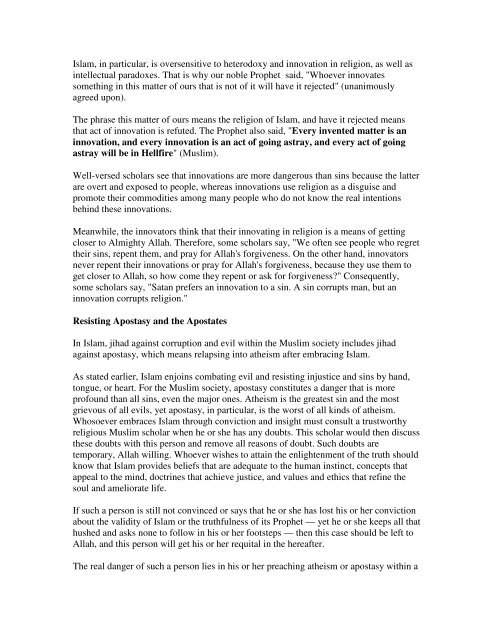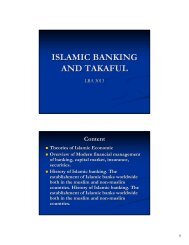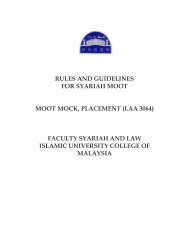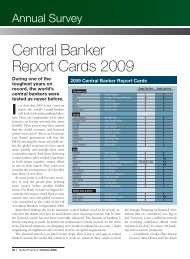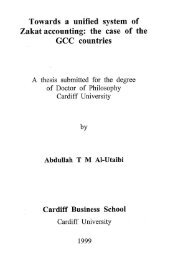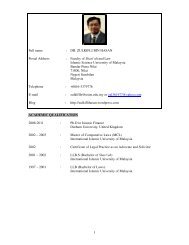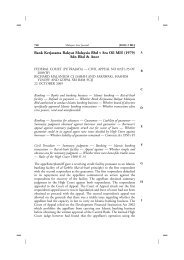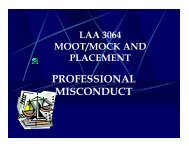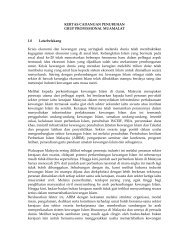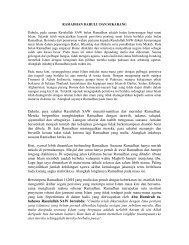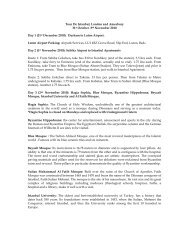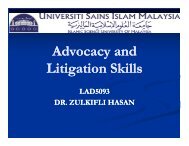Fiqh al Jihad Sheikh Yusuf al Qaradhawi
Fiqh al Jihad Sheikh Yusuf al Qaradhawi
Fiqh al Jihad Sheikh Yusuf al Qaradhawi
Create successful ePaper yourself
Turn your PDF publications into a flip-book with our unique Google optimized e-Paper software.
Islam, in particular, is oversensitive to heterodoxy and innovation in religion, as well as<br />
intellectu<strong>al</strong> paradoxes. That is why our noble Prophet said, "Whoever innovates<br />
something in this matter of ours that is not of it will have it rejected" (unanimously<br />
agreed upon).<br />
The phrase this matter of ours means the religion of Islam, and have it rejected means<br />
that act of innovation is refuted. The Prophet <strong>al</strong>so said, "Every invented matter is an<br />
innovation, and every innovation is an act of going astray, and every act of going<br />
astray will be in Hellfire" (Muslim).<br />
Well-versed scholars see that innovations are more dangerous than sins because the latter<br />
are overt and exposed to people, whereas innovations use religion as a disguise and<br />
promote their commodities among many people who do not know the re<strong>al</strong> intentions<br />
behind these innovations.<br />
Meanwhile, the innovators think that their innovating in religion is a means of getting<br />
closer to Almighty Allah. Therefore, some scholars say, "We often see people who regret<br />
their sins, repent them, and pray for Allah's forgiveness. On the other hand, innovators<br />
never repent their innovations or pray for Allah's forgiveness, because they use them to<br />
get closer to Allah, so how come they repent or ask for forgiveness?" Consequently,<br />
some scholars say, "Satan prefers an innovation to a sin. A sin corrupts man, but an<br />
innovation corrupts religion."<br />
Resisting Apostasy and the Apostates<br />
In Islam, jihad against corruption and evil within the Muslim society includes jihad<br />
against apostasy, which means relapsing into atheism after embracing Islam.<br />
As stated earlier, Islam enjoins combating evil and resisting injustice and sins by hand,<br />
tongue, or heart. For the Muslim society, apostasy constitutes a danger that is more<br />
profound than <strong>al</strong>l sins, even the major ones. Atheism is the greatest sin and the most<br />
grievous of <strong>al</strong>l evils, yet apostasy, in particular, is the worst of <strong>al</strong>l kinds of atheism.<br />
Whosoever embraces Islam through conviction and insight must consult a trustworthy<br />
religious Muslim scholar when he or she has any doubts. This scholar would then discuss<br />
these doubts with this person and remove <strong>al</strong>l reasons of doubt. Such doubts are<br />
temporary, Allah willing. Whoever wishes to attain the enlightenment of the truth should<br />
know that Islam provides beliefs that are adequate to the human instinct, concepts that<br />
appe<strong>al</strong> to the mind, doctrines that achieve justice, and v<strong>al</strong>ues and ethics that refine the<br />
soul and ameliorate life.<br />
If such a person is still not convinced or says that he or she has lost his or her conviction<br />
about the v<strong>al</strong>idity of Islam or the truthfulness of its Prophet — yet he or she keeps <strong>al</strong>l that<br />
hushed and asks none to follow in his or her footsteps — then this case should be left to<br />
Allah, and this person will get his or her requit<strong>al</strong> in the hereafter.<br />
The re<strong>al</strong> danger of such a person lies in his or her preaching atheism or apostasy within a


